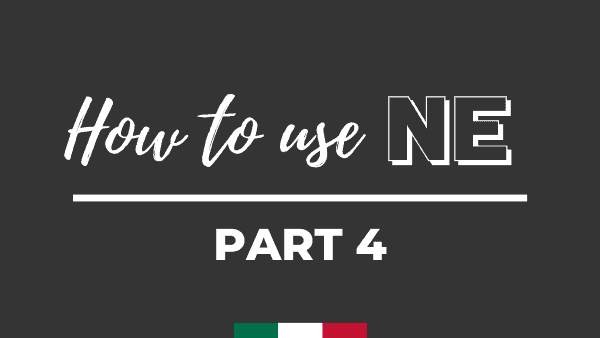The many meanings of CI
Juha from Sydney, Australia asks: “What are the many meanings of CI“?
What is this “CI” I see everywhere?
One of the most recurring and obscure words in Italian for students of Italian is “CI“.
“CI” is a “particle“, that is, it's a little word that we use to create specific meaning, but it does not refer to an object or anything like that. It is NOT a noun.
Download the PDF
No email required
Meaning of “US” [Direct Object Pronoun]
The most common meaning of “CI” is as a Direct Object Pronoun (the object of a verb). Specifically “CI” refers to anything that has to do with “US” (as in, “you and me“).
▷ SOME EXAMPLES:
LORO CI AMANO
They love us
TU CI VEDI
You see us
Like all Direct Object Pronouns, CI goes right before the verb (unlike in English).
The Direct Object Pronouns
| MI | me |
| TI | you |
| LO | him/it |
| LA | her/it |
| CI | us |
| VI | you guys |
| LI | them (masculine) |
| LE | them (feminine) |
Learn Italian to Fluency
- The program you've been dreaming of is here
- Better than having a private tutor
- In-Depth Italian lessons for complete clarity
- Extensive pratice opportunities
- Access to our community - you are never alone!
- A true learning experience to Italian Fluency
Meaning of “TO US” or “FOR US” [Indirect Object Pronoun]
Another common meaning of “CI” is as an Indirect Object Pronoun meaning “FOR US” or “TO US“. It basically replaces the recipient of a verb.
▷ SOME EXAMPLES:
LEI CI DA UN LIBRO
She gives us a book (she gives a book to us)
CI HANNO PORTATO UN TIRAMISÙ
They brought us a tiramisù (they brought a tiramisù to us)
Like all Indirect Object Pronouns, CI goes right before the verb (unlike in English).
The Indirect Object Pronouns
| MI | to me / for me |
| TI | to you / for you |
| GLI | to him / for him |
| LE | to her / for her |
| CI | to us / for us |
| VI | to you guys / for you guys |
| GLI* | to them / fot them |
There is another way of saying “TO THEM” and it's with the pronoun “LORO“, which must be placed AFTER THE VERB.
GLI HO DATO UN REGALO
I gave them a present
or
HO DATO LORO UN REGALO
I gave them a present
Meaning of “OURSELVES” or “EACH OTHER”[Reflexive Pronoun]
When used with Reflexive Verbs or Reciprocal Verbs, “CI” means “OURSELVES” or “EACH OTHER“, based on the context.
▷ SOME EXAMPLES:
NOI CI LAVIAMO
We wash ourselves
NOI CI AMAVAMO
We used to love each other
NOI CI RICORDIAMO
We remember
A very frequent and somehow difficult to catch meaning of “CI” is “THERE”, used to replace a place that was previously mentioned.
| MI | myself |
| TI | yourself |
| SI | himself, herself, itself, oneself |
| CI | ourselves, each others |
| VI | yoursleves, each others |
| SI | themselves, each others |
Meaning of “THERE”
A very frequent and somehow difficult to catch meaning of “CI” is “THERE“, used to replace a place that was previously mentioned.
▷ SOME EXAMPLES:
QUANDO VAI A ROMA?
CI VADO DOMANI
When are you going to Rome?
I'm going (there) tomorrow
PERCHÉ HAI LA BORSA?
PER METTERCI I SOLDI!
Why do you have a bag?
To put money in it
NEL FRIGO C'È UNA BIRRA
There's a beer in the fridge
PER CENA C'È LA PIZZA
There's pizza for dinner
TI CI PORTO
I'll take you there
“CI” with the meaning of “THERE” can only be used right BEFORE the verb. It cannot be used at the end of a sentence, with the meaning of “OVER THERE” (for which we use either “LÀ” or “LÌ“).
DOMANI CI VADO
Tomorrow I'm going there (the place we are talking about)
DOMANI VADO LÀ
Tomorrow I'm going there (the place I'm pointing at)
Learn Italian to Fluency
- The program you've been dreaming of is here
- Better than having a private tutor
- In-Depth Italian lessons for complete clarity
- Extensive pratice opportunities
- Access to our community - you are never alone!
- A true learning experience to Italian Fluency
Meaning of “ABOUT IT”
Now this one is really hard to get used to… Sometimes “CI” simply means “ABOUT IT” and refers back to whatever was said… and often is not translated into English.
▷ SOME EXAMPLES:
CHI PREPARA LA CENA?
CI PENSO IO
Who's making dinner?
I'll think about it (as in “I'll take care of it”)
CI PENSI CHE DOMANI SAREMO IN ITALIA?
Can you believe that tomorrow we'll be in Italy?
(can you think about the fact that …)
VIENI CON NOI AL CINEMA?
FAMMICI PENSARE
Are you coming to the cinema with us?
Let me think about it
“CI” with the meaning of “ABOUT IT” is often encountered with verbs of opinion like PENSARE (to think), CREDERE (to believe) and TROVARE (to find).

Understand spoken Italian
- Unique Course based on an Audio Novel in Italian
- Develop your comprehension of natural spoken Italian
- Learn to understand different Italian accents
- Follow along an entertaining Novel set in Italy
- 12 week program to take you to full comprehension
- A plethora of incredbly useful supporting resources
“CI” with basically NO MEANING…!
And this one is the one that drives most learners of Italian mad.
Very often you will see/hear a CI and won't be able to make sense of it.
And that's because that particular instance of CI has no meaning/translation in English!!! Mad, right?
Well, not so much! While it may not have a direct translation into English, that CI has all the right to be there, because it's part of a verb that you probably don't know. But think you know!
The verbs below ALL exist in their basic form (the one you probably know) AS WELL AS in their form with the CI attached.
- CREDERCI
- METTERCI
- AVERCELA
- FARCELA
- VEDERCI
CREDERCI means “to believe in something”, while CREDERE simply means “to believe”.
METTERCI refers to “the time that it takes to do something”, while METTERE means “to put”.
AVERCELA means “to be mad at somebody”, while AVERE clearly means “to have”. Here the CI has been changed to CE to sound better!
FARCELA means “to manage, to succeed at something”, while FARE means “to do” or “to make”. Here too the CI has been changed to CE for sound reasons.
VEDERCI refers to “the ability to see” (not being blind), while VEDERE simply means “to see”.
▷ SOME EXAMPLES:
CREDI AI FANTASMI?
NO, NON CI CREDO
Do you believe in ghosts?
No, I don't believe in them
QUANTO CI METTE IL TRENO PER ARRIVARE A FIRENZE?
How long does the train take to get to Florence?
CE LA FAI A VENIRE ALLA FESTA?
Can you make it to the party?
VOGLIO APRIRE LA FINESTRA MA NON CE LA FACCIO…
I want to open the window but I can't (I'm not managing)
MA CHE NON CI VEDI?
Man, can't you see? Are you blind?
DI SERA NON CI VEDO MOLTO BENE
At night I can't see too well
join our italian community
- Access a ton of content on this website
- Weekly Digest with a ton of Italian lessons, videos & facts!
- Invitation to Live Q&A Lessons with Manu
- Invitation to exclusive Webinars, Live Lessons & Games
- Coupons, Discounts & Specials for our Premium Italian Courses
THE SOLUTION TO ALL YOUR PROBLEMS…
Well, just the ones relating to CI, to an extent! 😉
A trick to understand which meaning is being given to “CI” when you hear it is to quickly ask yourself the following questions in this exact order:
1. Does it have to do with “US”? [us, to us, for us]
2. Can it be referring to “OURSELVES” or “EACH OTHER”?
3. Is it perhaps replacing a place that was mentioned earlier?
4. Can it mean “ABOUT IT”?
If the answer for all the questions is NO, then you are most likely dealing with a VERB that you think you know, but you actually don't. That is a verb that uses CI to create a new meaning.
These are like “phrasal verbs” in English (“go up“, “go for“, “go at” etc): if you don't know the meaning of the verb, you just can't guess it!
Make a mental note of the verb you heard the CI with and then look it up on a dictionary to discover its actual meaning.
For example, if you hear:
CI PROVO DOMANI
You'd look up PROVARCI to see if it exists with a specific meaning. In this case “to have a go at something“.
Download the PDF
No email required



